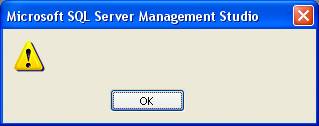
The SQL Server 2005 readme has the solution (although the problem description is not exactly the same - it seems to help in this case too):
- In Control Panel, open Add or Remove Programs.
- Click Microsoft .NET Framework 2.0.
- Click Change/Remove.
- Click Repair, and then click Next.
- When the repair is completed, restart the computer if you are prompted to do this

9 comments:
Worked for me!
Great news!
Glad the post could be of service ;-)
I had a similar problem. .NET 2.0 did want to repair or uninstall for it was used by some progms, but I repaired .NET 3.5 SP1 (my latest) and worked fine! Thanks for the tip ;)
I am glad it helped.
Thank YOU for the tip when .NET 3.5 is installed, I am sure many people have this version installed right now.
Thank you! fyi - I had to copy the shortcut of the SQL Server Management Studio in the start menu again.
Best Regards
M
Sweet. This worked for me as well when I did "change" for .NET 2.0 SP1. My problem started when I was doing a different install and had to reboot and forgot SSMS was open and had to force it to close.
At work with sql files I advise to use-sql *mdf recovery,because software has many other capabilities and has free status to the best of my memory,program can help with this problem and retrieve the data, that was considered to be lost,mwill extract housekeeping data from the source database and preview the data, that can be recovered,this tool is a good solution to recover data from corrupted databases in MS SQL Server format,restore databases represent files, like any other documents, they can be easily corrupted by viruses, all sorts of malware, hard drive failures, file system errors, incorrect user actions, etc,supports both data extraction to your hard drive as scripts in SQL format and data export directly to a database in MS SQL Server format.
This started after .NET Framework 1.1 update (although I had .NET 3.5 installed at that time). Repair of .NET 3.5 solved this mysterious message box problem. Thanks
Thank You :)
Post a Comment